
A Day In The Life of Grace Kivumbi
![]() Cairdeas
Cairdeas
![]() 29th January 2019
29th January 2019
My name is Grace Kivumbi and I am the Unit Manager with the Palliative Care Education & Research Consortium (PcERC) & MPCU based in Kampala, Uganda. So where do I start in telling you about my role? There is so much, and every day is different! What I am about to recount is not exactly a typical day, as this would be too much to pack into one day, so let me describe what might be a typical week or a month for me…..
I suppose the most important thing is for me is to keep the daily operations of the office up and running; I am supported by an administration assistant to do this. Finance is a big part of the role as I keep on top of budgets for both PcERC and the Makerere & Mulago Palliative Care Unit (MMPC). There are lots of requisitions to complete as I ensure we stay accountable for all of the activities and projects we run, and there are so many statutory requirements that I have to make sure are met.
I am a ‘people person’ so whilst I do lots of behind-the-scenes work in supporting staff recruitment, contracts and appraisals, I love it when I get to work alongside people - I enjoy the camaraderie and support. For example, I have a colleague based in the UK (the Cairdeas Operations Director) and I enjoy it when we have Skype calls to work out issues regarding reports or finances. I like to collaborate, so this suits me, and although email is great it is even better to see someone’s face and connect that way!
You could say I keep other people moving! I mean this in so far as I provide logistical support for international placements in the unit, including flights, travel and accommodation. For example, when we have young doctors coming from the UK to do work placements here in Uganda, they are coming for anything from between two months to one year and, understandably, they have lots of questions about the culture, customs and practices, as well as the practicalities. I try to be available to answer all of their questions! Support ranges from helping with preparation for visas, arranging for them to travel from the airport to where they are staying, obtaining work licences and settling down to work with the team. It is lovely when they arrive and I am finally able to meet them.
Lots of my work is alongside the Cairdeas Medical Director, Dr. Mhoira Leng. Dr. Mhoira is very dynamic and energetic and she travels extensively throughout the world and I help with her travel plans and bookings. I sometimes wonder where she gets her energy from! I provide financial support to Dr. Mhoira including predicting monthly costs for international travel, advance requisitions and accountability.
There is a group called ‘The Cairdeas Faculty’. This is a group of professional volunteers who are linked to Cairdeas to create a pool of expertise, and who are available to support the work of Cairdeas and other partners through mentoring, training, curriculum development, capacity building and clinical work to facilitate the growth of palliative care. Whenever faculty members travel to Uganda I am often called upon to helpsort out the logistics including organising their airport transfers, accommodation and local travels.
We are lucky enough to manage some grant funding from National and International donors and grant makers for various projects, fieldwork and research. My work is kept interesting as I participate in both the grant writing and in the narrative reports that we send back to them to update them on progress and its so rewarding when our work and efforts in improving the quality of life of patients are families under our care is appreciated by those that support us.
One of the roles I am quite proud of is that I am currently champion for the American Cancer Society SOURCE - Strengthening Organisations for a United Response against the Cancer Epidemic. This is a program aimed at strengthening organisations in the different areas of organisation development and the role of the champion is to act as an internal change agent in the organisation. I am learning a lot from being part of this.
Of course, as with life in general, things at work can be unpredictable and sometimes precarious. Right now MPCU & PcERC are going through a hard time with funding, and we are energetically seeking donations to support our vital work. We are determined to keep planning and keep going in the face of hard times for the sake of those who rely on us, and I am keeping on top of our work plans and continuing to budget for the future of the Unit.
In March 2019 PcERC is launching an important fundraising campaign under the slogan - #bringinghope - this is really important for our future work and sustainability and we hope you will look out for it next month a consider supporting us.
I am so grateful for those of you reading this who have helped MPCU and PcERC to date and to those you who might be moved to help us in the future, thank you.
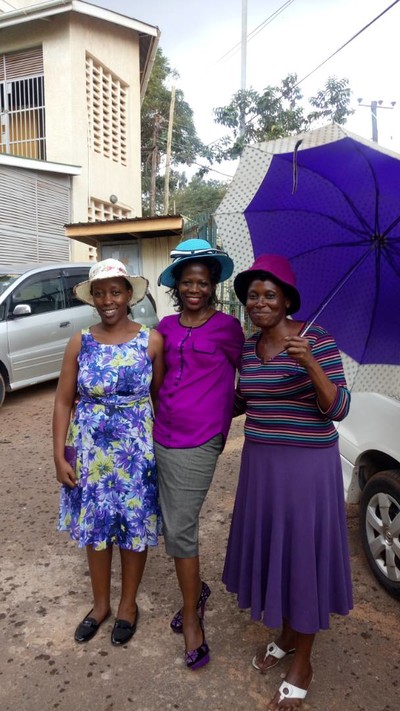
Grace (centre) looking dapper in her hat and flanked on either side by her colleagues, both named Liz!
An Inspiring Day at the SPCC Annual Conference
![]() Cairdeas
Cairdeas
![]() 28th January 2019
28th January 2019
Cairdeas is pleased to be a member of the Scottish Partnership for Palliative Care (SPCC). We firmly believe that networking, sharing, collaborating and learning together is the best way to promote and advance better palliative care for all. Whilst the focus of the SPCC is largely within Scotland, they regularly reach out to their neighbours within the UK, and to partners working internationally – such as Cairdeas - to learn about best practice and case studies from throughout the world.
We were delighted to have a number of Cairdeas delegates attend the SPCC’s annual conference, which took place in the Royal College of Physicians in Edinburgh in November, and to share the word about what we do via an information stand that we had on the day. It was a wonderful opportunity to meet faces old and new, and to hear fresh thinking from those who study and work in palliative care.
Chief Executive of SPCC, Mark Hazelwood, chaired the day, and kept delegates on their toes by using interactive technology to collect the names of a song or piece of music each of us would like to have played at our funeral. A dizzying array of songs and artists (from ABBA to Led Zepplin, Ave Maria to Bohemian Rhapsody) appeared on the screen behind Mark, which immediately set the scene for a day that was focused on the personal: a day of stories. Each of the speakers had his or her own unique take on the conference title: “The Sense of an Ending: stories, meanings and understanding.”
Kristian Pollock, Professor of Medical Sociology at the University of Nottingham, opened with a challenging presentation that was based around her qualitative research on end of life care. She gently challenged the notion of a ‘good death’ and reminded us to not to use the term as a whitewash or to use it to paint a picture of death through rose-tinted spectacles. Of course, we ought to all seek to have a ‘good death’, but we might be building unrealistic expectations if we do not also acknowledge the hard decisions and unanticipated feelings.
Christian Busch, Hospital Chaplain in Rigshospitalet, Copenhagen told us that, in his experience, people at the end of their lives often aren’t seeking answers but are seeking presence: a witness, someone to be there with them. His presentation drew on the work of Søren Kierkegaard, Danish philosopher, theologian and poet whose basis for helping others was: “to take care to find him where he is, and begin there.” Christianstressed that feeling extreme anxiety at the diagnosis of a life-limiting condition is a healthy and normal response to having lost control of all those things we once had control of. As a chaplain, he is there with people at the end of their lives to help them look backwards, and to look forwards; to help them identify what brings their life meaning and how to bring what is meaningful to bear in the last days of their lives.
Dr Donald Macaskill, Chief Executive of Scottish Care, also expanded on the importance of the psycho-spiritual care alongside medical care and pain relief. Scottish Care organisation has almost 1,000 care home/housing support services as members and he had many stories – not least that of his own grandmother - of exemplary care as people die. Hearing their story, reviewing their life was, Donald felt so important to brining that ‘sense of an ending’ for both those leaving and those staying behind.
This is always an inspiration day and we look forward to the next SPPC conference in September 2019.
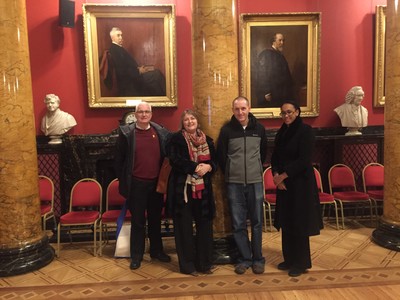
Some of the Cairdeas delegates at the SPCC Conference - trustees, staff, and Cairdeas Faculty: Grahame Tosh, Dr. Mhoira Leng, Dr. Dave Fearon and Dr. Nahla Gafer
Developing Palliative Care in Mauritania
![]() Cairdeas
Cairdeas
![]() 25th January 2019
25th January 2019
Dr. Dave Fearon is the Cairdeas Medical Director for the Sahara region. In this blog, he shares a fascinating insight into his work in Mauritania and the cultural differences that impact palliative care there.
“We at Cairdeas Sahara take a holistic approach to our patients. In addition to caring for their physical needs, we try to care for their social, spiritual, and emotional needs. As palliative care develops in Mauritania, we also acknowledge the need for a holistic approach to building capacity long term. It is not OK to just care for a few patients located in the capital and ignore the suffering of others. Therefore, we have an approach which incorporates training, advocacy and research. We are pleased to announce that we have recently had an article published in the respected Anglophone journal ‘Palliative Medicine’. This article is based on research that ran parallel to a national palliative care capacity building program sponsored by Tropical Health Education Trust (THET) and Johnson & Johnson, between 2016 and 2017. I would like to tell you about the study - the participants and results:
The participants: We carried out interviews and focus groups with 76 research participants recruited from across rural Mauritania. These included 33 out of the 75 health care professionals trained in palliative, 12 recently bereaved family members and 31 community leaders.
Results: Overall, we found that the principles of palliative care were warmly welcomed by everyone involved. But it was often the family with direct experience of losing someone who most valued what we were proposing. In the article we discuss the following:
The strong belief in destiny leads people to believe that illness only comes when God decides it, and that the person will die only at the date, time, and manner of God’s choosing. This view is based on a different perspective of human-God relationship than is found in Christianity. Death is not related to an illness, and therefore participants struggled with the idea of a life-limiting illness upon which palliative care is founded.
Doctors and nurses really struggle with communication regarding palliative care. In the past we have tried to train doctors and nurses in sensitively breaking bad news, such as a diagnosis of cancer or when it has to the bones. However, our research has illustrated how the problems with communication are much more fundamental. Doctors and nurses often provide no information, or misleading information. They fail to communicate the diagnosis or its treatment, irrespective of whether it is a simple, time-limited illness or a life-threatening illness.
Religious faith and cultural practices combine to create a uniquely Mauritanian perspective of a good death. No one is sure of where they will go after death and so the family try to look for reassurance and ways to increase the chances of their loved one getting into paradise. This occurs during life and after death, for example the family paying off any remaining debts left by the deceased.
This new knowledge and awareness has already been incorporated in how we train doctors and nurses in palliative care, and how we care for patients and their families. We are pleased that the nurse NDiaye, the champion of palliative care in Mauritania, was part of the writing team on this article. This will be his first academic publication and is a good start as he takes on more responsibility for the palliative care project over the coming months.”
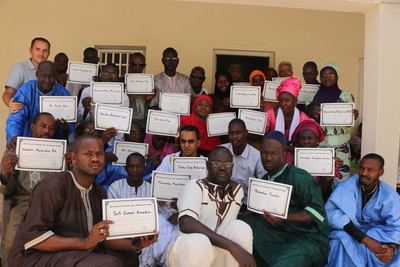
Dr. Dave Fearon (top left) with a group of workers receiving their certificates in palliative care
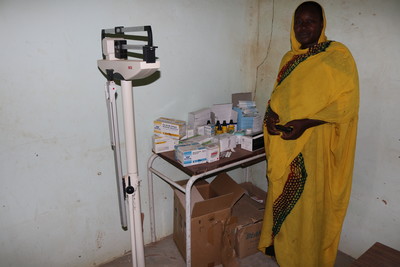
A rural care worker with a small supply of medications for her village
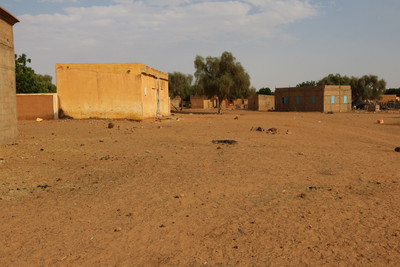
A picture of the clinic in which the rural care worker is based

All in a day's work! A car is stuck in the sand during house visits
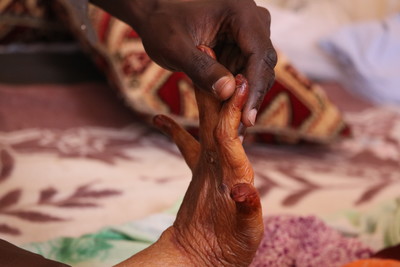
Reaching out, holding, caring, creating space
